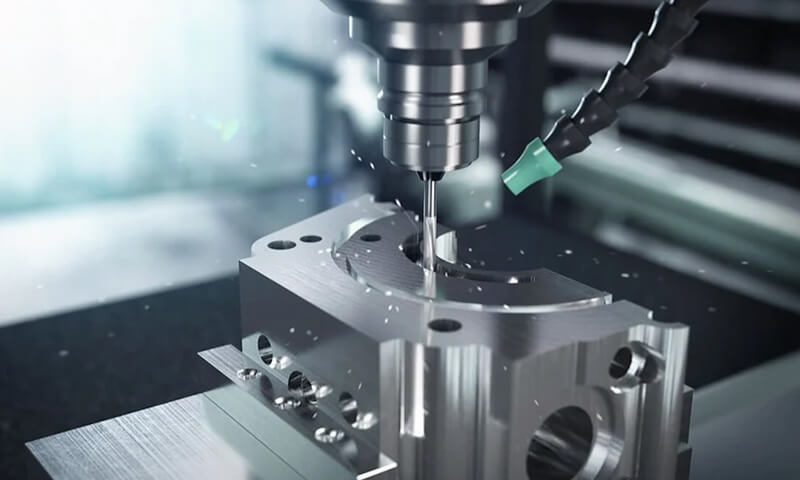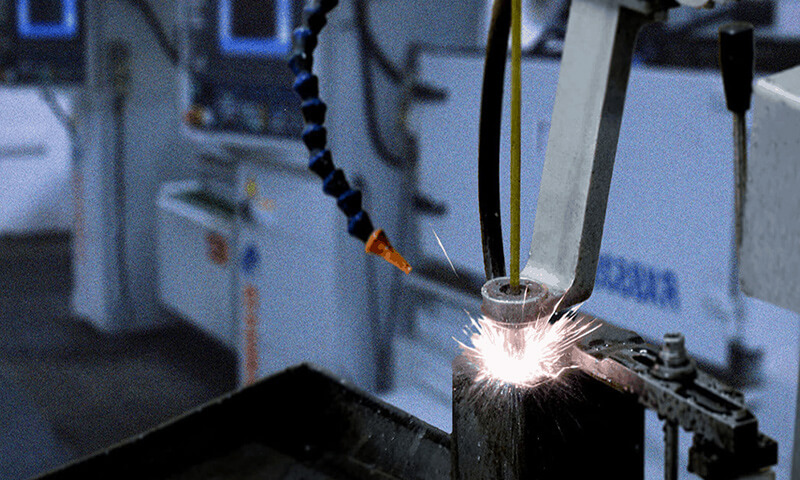Imagine bridges crumbling, vehicles breaking down, and aircraft safety compromised—all due to the relentless force of corrosion.
In industries such as marine, karozzi, u aerospazjali, materials are constantly exposed to harsh environments that accelerate this destructive process.
Ensuring components can withstand these conditions is not just a matter of preference; hija ħtieġa.
1. Introduzzjoni
Ħarsa ġenerali:
Corrosion-resistant metals are specifically designed to prevent the deterioration of materials due to environmental factors like moisture, kimiċi, u estremi tat-temperatura.
F'industriji bħall-ajruspazju, karozzi, kostruzzjoni, u tal-baħar, selecting the right corrosion-resistant material can mean the difference between product success and failure.
These metals help extend the lifespan of critical components, tnaqqas l-ispejjeż tal-manutenzjoni, and improve the overall reliability of machines and structures.
Skop:
This blog will explore the types of corrosion-resistant metals, il-benefiċċji tagħhom, how they work to protect against corrosion, and the applications where they are most commonly used.
Barra minn hekk, we will cover how to choose the best metal for your project, skond il-kundizzjonijiet ambjentali, ħtiġijiet tal-prestazzjoni, u l-baġit.
2. What is Corrosion Resistance?
Definizzjoni: Corrosion is the natural process of material degradation due to its interaction with environmental elements such as water, arja, jew kimiċi.
It primarily affects metals, leading to rust and loss of structural integrity.
Corrosion resistance refers to the ability of a material to resist this degradation, ensuring it maintains its functionality and appearance over time.
Corrosion Mechanisms
Several types of corrosion can affect metals:
- Ossidazzjoni: A reaction between oxygen and metal, leading to rust formation. Ħadid, per eżempju, can lose up to 10% of its mass within a year in humid environments.
- Pitting: Localized corrosion that creates small holes or pits in the metal surface. Stainless steel grade 316 has been shown to resist pitting even after prolonged exposure to seawater.
- Korrużjoni Galvanika: Occurs when two dissimilar metals come into contact in the presence of an electrolyte, causing one to corrode preferentially.
Zinc coatings can reduce galvanic corrosion by up to 80%.

Importance in Manufacturing:
Corrosion resistance is essential in industries such as construction, enerġija, trasport, and offshore applications.
Pereżempju, fl-ajruspazju, materials need to withstand extreme temperatures and exposure to oxygen without degrading.
Fil-kostruzzjoni, buildings need to resist corrosion from environmental factors like rain and humidity.
Għalhekk, selecting the right corrosion-resistant material helps avoid costly repairs and enhances the longevity of parts.
3. Types of Corrosion-Resistant Metals
Azzar li ma jissaddadx
Azzar li ma jissaddadx gradi bħal 304 u 316 offer excellent resistance to rust and corrosion, combining strength with versatility.
Grad 316 stainless steel contains 2-3% molibdenu, which significantly enhances its resistance to pitting and crevice corrosion.
Commonly used in kitchen equipment, Apparat mediku, u applikazzjonijiet arkitettoniċi, stainless steel’s hygienic and aesthetic qualities add value beyond just durability.

Titanju
Titanju boasts exceptional resistance to corrosion in aggressive environments, including seawater and industrial chemicals.
Huwa 45% lighter than steel yet offers comparable strength. Titanium’s lightweight yet strong properties make it ideal for high-performance applications in aerospace, Marine, u impjanti mediċi.
Studies show that titanium can maintain its integrity for over 50 snin f'ambjenti tal-baħar.
Ligi tal-aluminju
Aluminju alloys are known for being lightweight and naturally corrosion-resistant, particularly when treated with protective coatings such as anodizing.
The natural oxide layer further enhances its resistance, making it popular in the automotive, aerospazjali, and packaging industries.
Anodized aluminum can increase corrosion resistance by up to 90%, making it a preferred choice for outdoor applications.

Ligi tan-nikil
Ligi tan-nikil, such as Inconel and Monel, exhibit high corrosion resistance in extreme conditions, including high temperatures and harsh chemicals.
Inconel, Pereżempju, can withstand temperatures up to 2000°F (1093° C.) and resist oxidation and carburization.
These alloys are widely used in oil & gas and chemical processing industries for their durability and reliability.
Ligi taż-żingu
Zinc alloys protect through galvanization, where a zinc coating shields underlying steel or iron from rust.
Galvanized steel can last up to 70 years in rural environments and up to 35 years in urban areas. Common applications include automotive parts, fencing, and electrical appliances.
Ram u Ligi tar-ram
Ram naturally resists corrosion and develops a protective patina over time.
Its excellent conductivity and resistance to marine environments make it suitable for marine hardware, Konnetturi elettriċi, and architectural finishes.
Copper’s corrosion rate is less than 0.005 inches per year, ensuring long-term durability in coastal and marine settings.

4. How Do Corrosion-Resistant Metals Work?
Natural Protection Mechanisms:
Corrosion-resistant metals naturally form oxide layers on their surfaces when exposed to air or water.
Pereżempju, aluminum naturally develops a thin oxide layer, which protects the underlying metal from corrosion.
Bl-istess mod, titanium’s oxide layer provides an excellent barrier against aggressive chemicals.
Coatings and Treatments:
- Anodizzazzjoni: An electrochemical process that enhances aluminum’s natural oxide layer.
The process increases corrosion resistance, itejjeb ir-reżistenza għall-ilbies, and allows for a range of colors for aesthetic purposes. - Galvanizzar: Zinc is applied to steel to provide a sacrificial layer that corrodes before the underlying steel does. This is ideal for steel parts exposed to harsh outdoor environments.
- Elettroplating: Metals like nickel and chromium are applied to steel or aluminum to provide a durable protective coating, enhancing both aesthetics and resistance to corrosion.
Elementi tal-liga:
- Kromju in stainless steel helps form a passive oxide layer that resists rusting and enhances the material’s longevity.
- Nickel in alloys like Monel increases resistance to corrosion in acidic and high-temperature environments.
- Molibdenu is commonly added to stainless steel grades like 316 to improve resistance to pitting and crevice corrosion in chloride environments.
5. Benefits of Corrosion-Resistant Metals
Durabilità u Lonġevità
The primary advantage of corrosion-resistant metals is their durability.
By preventing corrosion, these metals ensure that parts can withstand prolonged exposure to harsh environments without deteriorating.
This translates into fewer replacements and longer lifespans for products.
Maintenance Savings
With corrosion-resistant materials, industries can reduce the need for frequent repairs and replacements, thus lowering maintenance costs.
This is particularly crucial for industries like marine, aerospazjali, u żejt & gass, where downtime can be expensive.
Appell Estetiku
Metals like stainless steel and copper are prized not only for their functional properties but also for their attractive appearance, adding value to products and structures.
Stainless steel’s shiny finish can last for decades without tarnishing, maintaining its visual appeal.
Sostenibbiltà
Using corrosion-resistant metals contributes to sustainability by promoting longer-lasting products that require fewer resources to maintain and replace.
Pereżempju, replacing traditional steel with corrosion-resistant alternatives can reduce material waste by up to 60%.
6. Applications of Corrosion-Resistant Metals
Industrija tal-Baħar
Bastimenti, pjattaformi offshore, and coastal infrastructure rely on corrosion-resistant metals to withstand constant exposure to saltwater.
Using titanium in marine applications can reduce corrosion-related failures by up to 75%.
Aerospazjali
Ħafifa, strong materials resistant to corrosion ensure safety and performance in high-altitude environments.
Titanium and aluminum alloys are commonly used in aircraft components, increasing fuel efficiency by reducing weight.
Karozzi
Corrosion-resistant parts in cars, such as undercarriage and exhaust systems, increase vehicle lifespan and safety.
Galvanized steel used in automotive bodies can extend vehicle life by up to 20 snin.
Kostruzzjoni
Metal components exposed to outdoor weather, including stainless steel beams, copper roofing, and aluminum window frames, benefit from corrosion resistance.
Stainless steel’s use in building facades can reduce replacement costs by up to 50%.
Ipproċessar kimiku
Materials like titanium and nickel alloys resist corrosion in aggressive chemical environments, ensuring reliable operation in industrial processes.
Using nickel alloys in chemical reactors can prevent corrosion-related failures by up to 90%.
7. How to Choose the Right Corrosion-Resistant Metal
Environment and Exposure Conditions:
Consider the specific environmental conditions your components will be exposed to, bħat-temperatura, umdità, and exposure to chemicals or saltwater.
Pereżempju, titanium is ideal for seawater applications, while stainless steel is better for general use in mildly corrosive environments.
Qawwa u Durabilità tal-Materjal:
Different applications may require different levels of strength and durability.
High-strength applications such as aerospace or heavy machinery may require titanium or specialized nickel alloys, while lower-strength applications like packaging may only need aluminum alloys.
Konsiderazzjonijiet tal-ispejjeż:
While titanium and nickel alloys offer superior corrosion resistance, they are typically more expensive than materials like stainless steel or galvanized steel.
Evaluate your budget and the overall value of long-term durability when choosing a material.
Ħtiġijiet ta' Manutenzjoni:
Xi materjali, bħall-istainless steel, require minimal maintenance, filwaqt li oħrajn, such as zinc-coated steel, may need periodic touch-ups to maintain their corrosion resistance.
Choose a material based on how much maintenance is acceptable for your application.
8. Konklużjoni
Choosing the right corrosion-resistant metal is essential for ensuring the longevity, sigurtà, and efficiency of components in harsh environments.
By understanding the types of corrosion-resistant metals available and their applications, you can make informed decisions that optimize performance and reduce maintenance costs.
Whether for marine, karozzi, aerospazjali, or any industry facing corrosive challenges, selecting the appropriate material is key to sustainable and reliable operations.
FAQs
1. What is the most corrosion-resistant metal?
The most corrosion-resistant metals include titanju, Azzar li ma jissaddadx, u ligi tan-nikil.
Titanium offers exceptional resistance to corrosion in highly aggressive environments, inkluż l-ilma baħar, while stainless steel (speċjalment 316 grad) is highly resistant to rust and oxidation.
Ligi tan-nikil simili Inconel are resistant to high temperatures and chemicals, making them ideal for extreme conditions.
2. Can aluminum corrode?
IVA, aluminju jistgħu jissaddad, but it forms a protective oxide layer that helps prevent further corrosion.
This natural oxide layer can be enhanced through anodizing, which makes aluminum even more resistant to corrosion.
Madankollu, aluminum may still be vulnerable in highly acidic or alkaline environments without proper treatment.
3. Can I use corrosion-resistant metals in food processing?
IVA, Azzar li ma jissaddadx huwa komunement użat fi Ipproċessar tal-ikel due to its corrosion resistance, faċilità ta 'tindif, and hygienic properties.
It is widely used for tanks, pajpijiet, and utensils in food and beverage production, meeting strict food safety standards.
4. What is the best corrosion-resistant metal for high-temperature environments?
For high-temperature environments, ligi tan-nikil, bħal Inconel u Monel, are excellent choices due to their ability to withstand extreme heat without losing their corrosion resistance.
These alloys are commonly used in aerospazjali, Ġenerazzjoni tal-Enerġija, u Ipproċessar kimiku applikazzjonijiet.
5. How do I choose the best corrosion-resistant metal for my application?
When choosing a corrosion-resistant metal, consider factors such as espożizzjoni ambjentali (E.g., umdità, melħ, kimiċi), temperatura, stress mekkaniku, u ħtiġijiet estetiċi.
Pereżempju, titanju u Azzar li ma jissaddadx are ideal for most harsh environments, waqt aluminju is preferred for lightweight applications.
Consulting with a materials expert can help you select the best metal for your specific needs.



